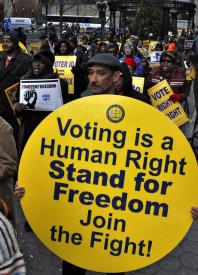|
Wednesday, April 14, 2021
 If your employer previously gave you good performance evaluations but is now giving you poor evaluations or even putting you on a “PIP”, a Performance Improvement Plan, you should call this law office today. I have successfully represented numerous employees of both public and private employers, who were unfairly placed on a “PIP” and given a warning to improve or risk termination. This undeserved downturn in evaluations is a ruse sometimes utilized by employers to have a trumped-up justification to fire an employee. Things to be noted are: Workload Increase Has your workload recently increased? If your workload significantly increased prior to the PIP, it could be that the employer is specifically setting you up to fail by setting unrealistic goal markers. Job Duty Changes If your job description and/or duties changed prior to the PIP, your employer could again be preparing to have an “alleged” legitimate reason to terminate you. Read more . . .
Monday, April 12, 2021
 The New Jersey Superior Court ruled in favor of an employee who complained to the employer about unsafe Covid-19 practices in the workplace in a whistleblower case. Unlawful Retaliation for Objecting to Employer’s Failure to Follow Covid-19 Health Safeguards As was recently decided in the case of Mark Loeb v. Vantage Custom Classics, Inc., if your employer retaliated against you for your complaining about or objecting to what you reasonably believed was the employer’s failure to follow proper health safeguards in the workplace as to Covid-19, you may have a whistleblower claim under the New Jersey Conscientious Employee Protection Act (CEPA.) If You Notified Employer That You Were Exposed to/or Had Contracted Covid-19 If you reported to your employer that you were exposed to Covid-19 and you wanted to follow proper government and/or medical guidelines as to quarantine, etc. Read more . . .
Saturday, April 10, 2021
 Although the Enron and WorldCom scandals around 2001-2002 perhaps caught the public eye like no other frauds, all levels of employees in all occupations may be asked to participate in a fraud to further the employer’s business agenda. They may believe there is fraud by employer’s practices without themselves being asked to participate. Employees may experience employment retaliation when they refuse or object to such business practices which they reasonably believe violates law or perpetuates a fraud. Such refusal or objection is considered “protected activity” under numerous state and federal statutes. If your employer did retaliate against you because of the “protected activity”, you may have a workplace retaliation claim, also known as a whistleblower claim. Read more . . .
Thursday, April 8, 2021
 Apartheid is a government law, policy, or legal system of segregation and discrimination on grounds of race. Apartheid is much more than segregation by race. It is shocking to me to learn how many people made it through 16+ years of schooling yet have no knowledge that Apartheid in the United States, Apartheid that was equal in its severity to that of South Africa at its worst, existed in the US from the 1870's until the mid-1960's. How can this not be truthfully taught in the schools? There is often a gratuitous mention of Black female historical leaders during Black History Month or Women’s History month, but it is overlooked that brave and hard-working Black women are the backbone of America on many fronts. Most people have heard of renowned abolitionist Harriet Tubman but do not know the extent of her bravery, selflessness and acts of heroism, or that she resided in NJ in the early 1850's, or that she worked as a covert operative for the Union army, organized massive espionage networks, successfully led 150 Union soldiers in a Union military operation, and did extensive work after the Civil War to help Blacks. Read more . . .
Saturday, March 27, 2021
 NJ employees may be getting pressure from their bosses and experience illegal employment retaliation for their wanting to adhere to Covid -19 safeguards in the workplace. If your boss retaliates against you because you complained about the lack of wearing masks in the workplace or lack of social distancing, you may have an employment retaliation claim under CEPA, NJ whistleblower statute, the Conscientious Employee Protection Act (“CEPA”), N.J.S.A. Read more . . .
Saturday, March 13, 2021
 Many employees at some point become unhappy with their work situation and feel “fed up” with their work environment. Sometimes they believe that their boss is pressuring them to resign. They may need time to secure another position with a different employer but are concerned about the lack of income during the period after they quit and before they secure new employment. If you are unhappy in your job and thinking about resigning, you should contact an experienced employment law attorney before you do so. If you think your employer is forcing you out, pressuring you to quit, discriminating against you, harassing you, or illegally retaliating against you, you can contact this law office now for a free consultation. Read more . . .
Saturday, February 27, 2021
 Since the Supreme Court’s 2013 decision in Shelby County v. Holder, the Court has taken on additional voter rights cases and continued the distancing of the federal judiciary as pro-active monitor for the Fourteenth Amendment. In 2018, in Husted v. A. Philip Randolph Inst. Read more . . .
Saturday, February 13, 2021
 NJ Employment Discrimation Attorney Historical Racism Part XI, Shelby County v. Holder Changed Way Voting Rights Act Implemented Nationwide; Justice Ruth Bader Ginsberg’s Dissent https://www.justice. Read more . . .
Monday, February 1, 2021
 Since 1976, every U.S. president has officially designated the month of February as Black History Month. As today is the first day of Black History Month, I will share my favorite quotes on Justice as authored by Dr. Martin Luther King, Jr. Read more . . .
Friday, January 22, 2021
 Many employees at some time feel that “enough is enough” on their job, are unhappy with their work situation, and want to quit and collect benefits while they try to locate a better employment position. Unfortunately, with rare exceptions, if a NJ worker voluntarily quits their employment position, she/he generally will not be entitled to receive unemployment benefits. If you are unhappy in your job and thinking about resigning, you should contact an experienced employment law attorney before you do so. If you think your employer is forcing you out, pressuring you to quit, discriminating against you, harassing you, or illegally retaliating against you, you can contact this law office now for a free consultation. In determining whether a claimant is entitled to benefits, the major question is whether the separation from work was involuntary. Read more . . .
Tuesday, January 19, 2021
 Details of 19th, 20th and 21st century Jim Crow culture and laws including payment of poll taxes and the requirement of passing complex literacy tests selectively given to suppress black votes, which tests were administered by local officials with no federal oversight, may be reviewed in the Nov. 24th and Dec. 8th articles. Gerrymandering was another method states employed for Black voter suppression. Gerrymandering Gerrymandering is defined by the Oxford dictionary as the manipulation of the boundaries of an electoral constituency to achieve a result to favor one class or party. Read more . . .
|

|
|
|